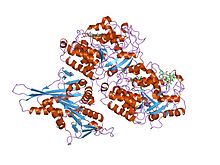Tubulin domain
Appearance
| Tubulin | |||||||||
|---|---|---|---|---|---|---|---|---|---|
 kif1a head-microtubule complex structure in atp-form | |||||||||
| Identifiers | |||||||||
| Symbol | Tubulin | ||||||||
| Pfam | PF00091 | ||||||||
| Pfam clan | CL0442 | ||||||||
| InterPro | IPR003008 | ||||||||
| PROSITE | PDOC00201 | ||||||||
| SCOP2 | 1tub / SCOPe / SUPFAM | ||||||||
| |||||||||
| Tubulin | |||||||||
|---|---|---|---|---|---|---|---|---|---|
 kif1a head-microtubule complex structure in atp-form | |||||||||
| Identifiers | |||||||||
| Symbol | Tubulin | ||||||||
| Pfam | PF00091 | ||||||||
| Pfam clan | CL0442 | ||||||||
| InterPro | IPR003008 | ||||||||
| PROSITE | PDOC00201 | ||||||||
| SCOP2 | 1tub / SCOPe / SUPFAM | ||||||||
| |||||||||
Tubulin/FtsZ family, GTPase domain is an evolutionary conserved protein domain.
This domain is found in all tubulin chains,[1] as well as the bacterial FtsZ family of proteins.[2] These proteins are involved in polymer formation. Tubulin is the major component of microtubules, while FtsZ is the polymer-forming protein of bacterial cell division, it is part of a ring in the middle of the dividing cell that is required for constriction of cell membrane and cell envelope to yield two daughter cells. FtsZ and tubulin are GTPases,[3] this entry is the GTPase domain. FtsZ can polymerise into tubes, sheets, and rings in vitro and is ubiquitous in bacteria and archaea.
References
- ^ Nogales E, Wolf SG, Downing KH (January 1998). "Structure of the alpha beta tubulin dimer by electron crystallography". Nature. 391 (6663): 199–203. doi:10.1038/34465. PMID 9428769.
- ^ Löwe J, Amos LA (January 1998). "Crystal structure of the bacterial cell-division protein FtsZ". Nature. 391 (6663): 203–6. doi:10.1038/34472. PMID 9428770.
- ^ Nogales E, Downing KH, Amos LA, Löwe J (June 1998). "Tubulin and FtsZ form a distinct family of GTPases". Nat. Struct. Biol. 5 (6): 451–8. doi:10.1038/nsb0698-451. PMID 9628483.
